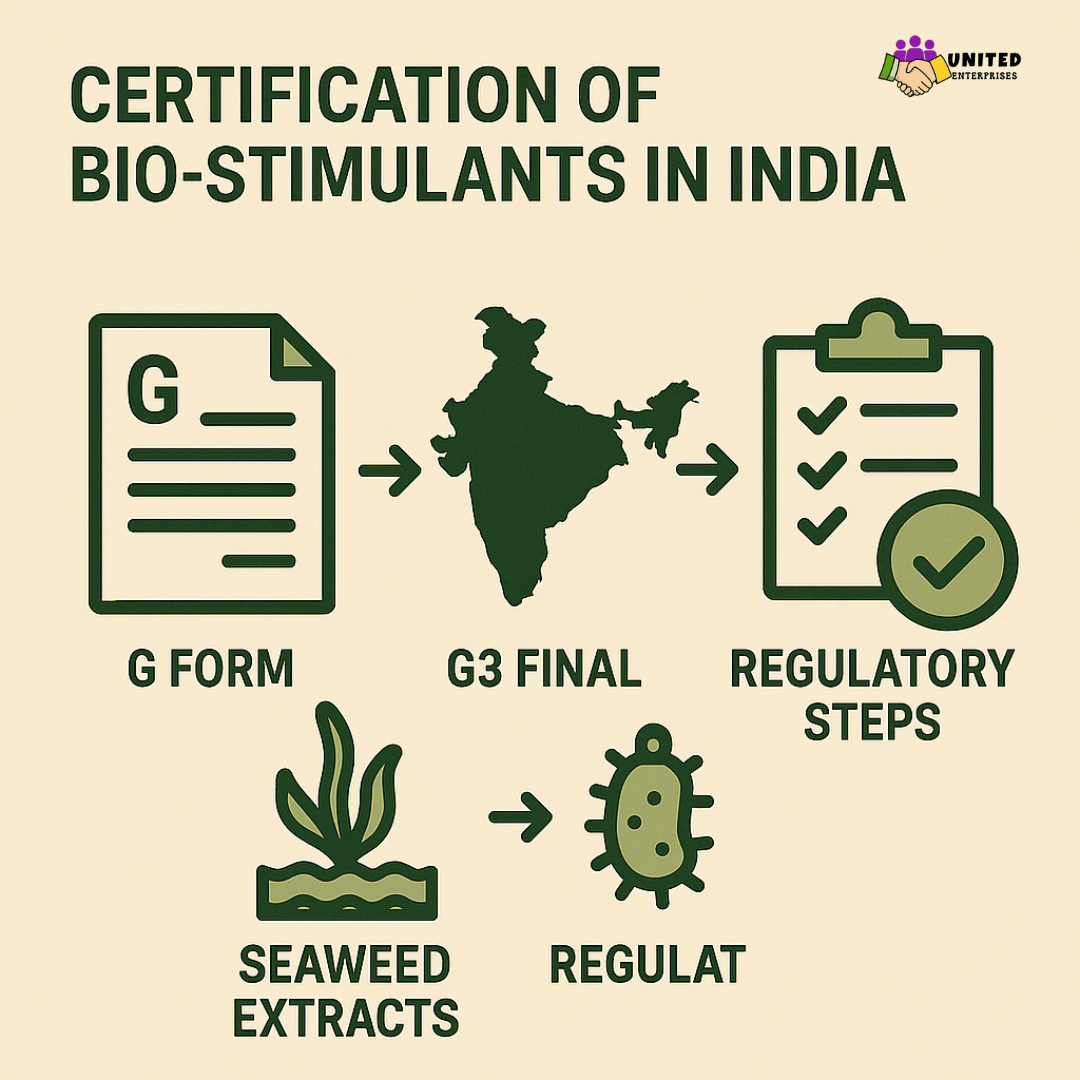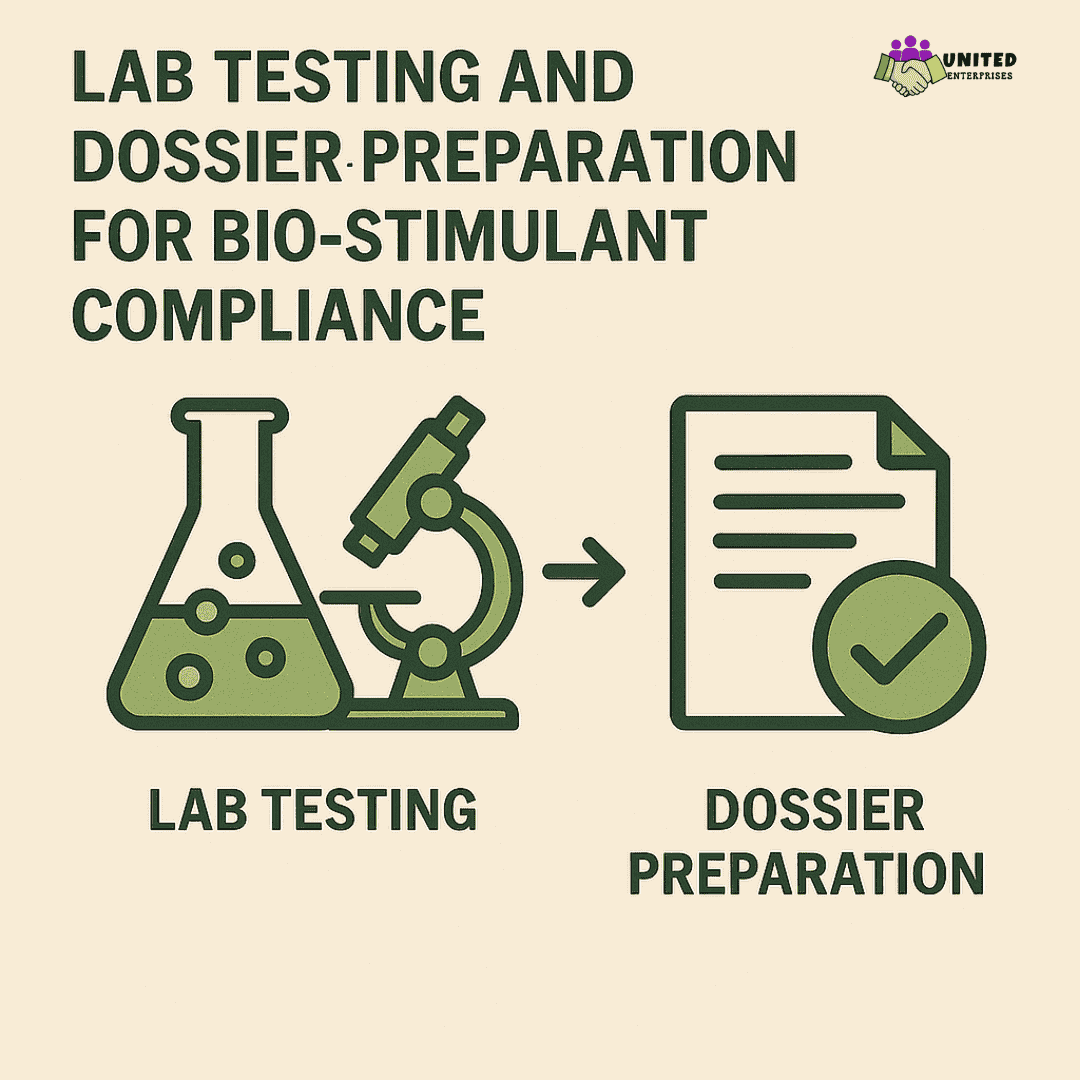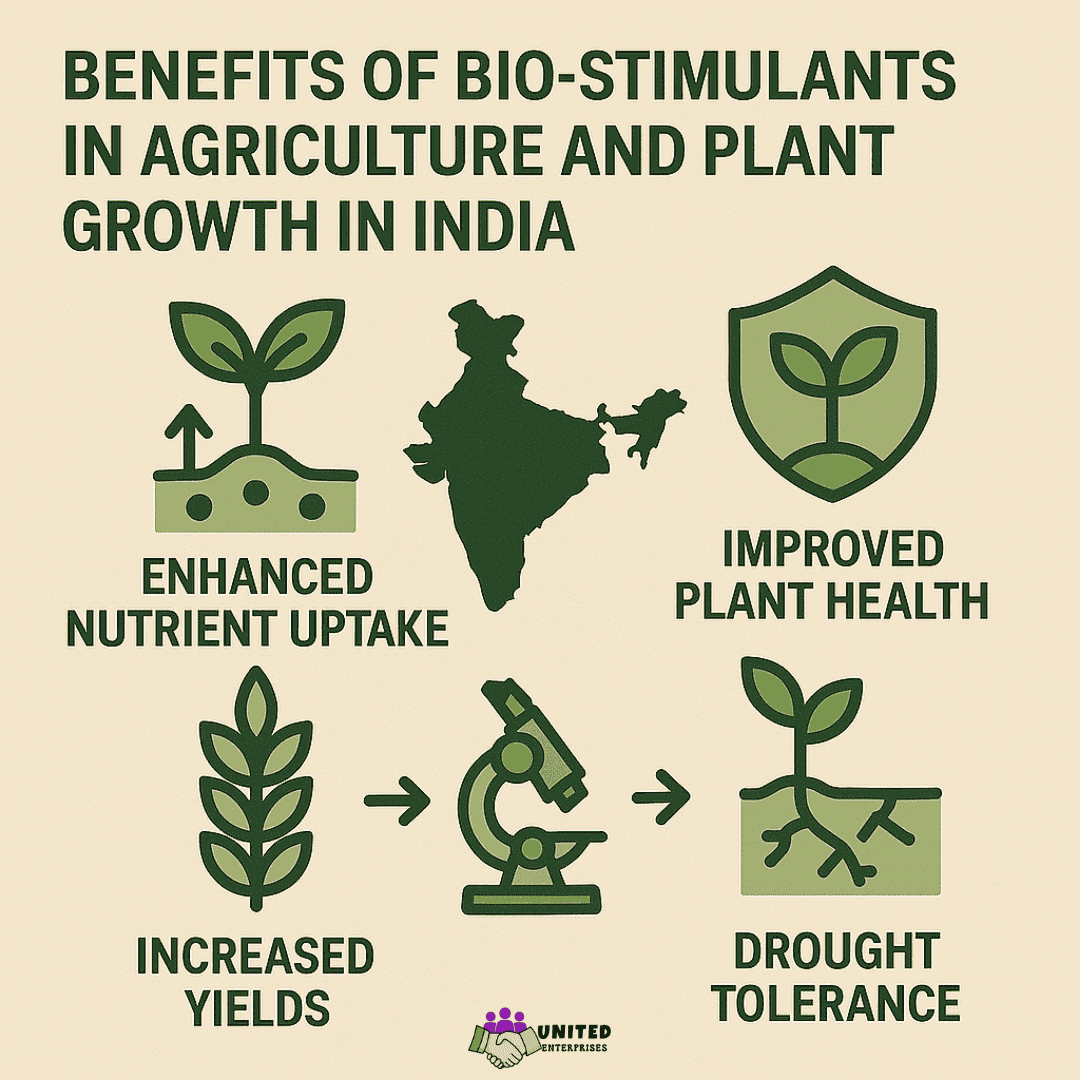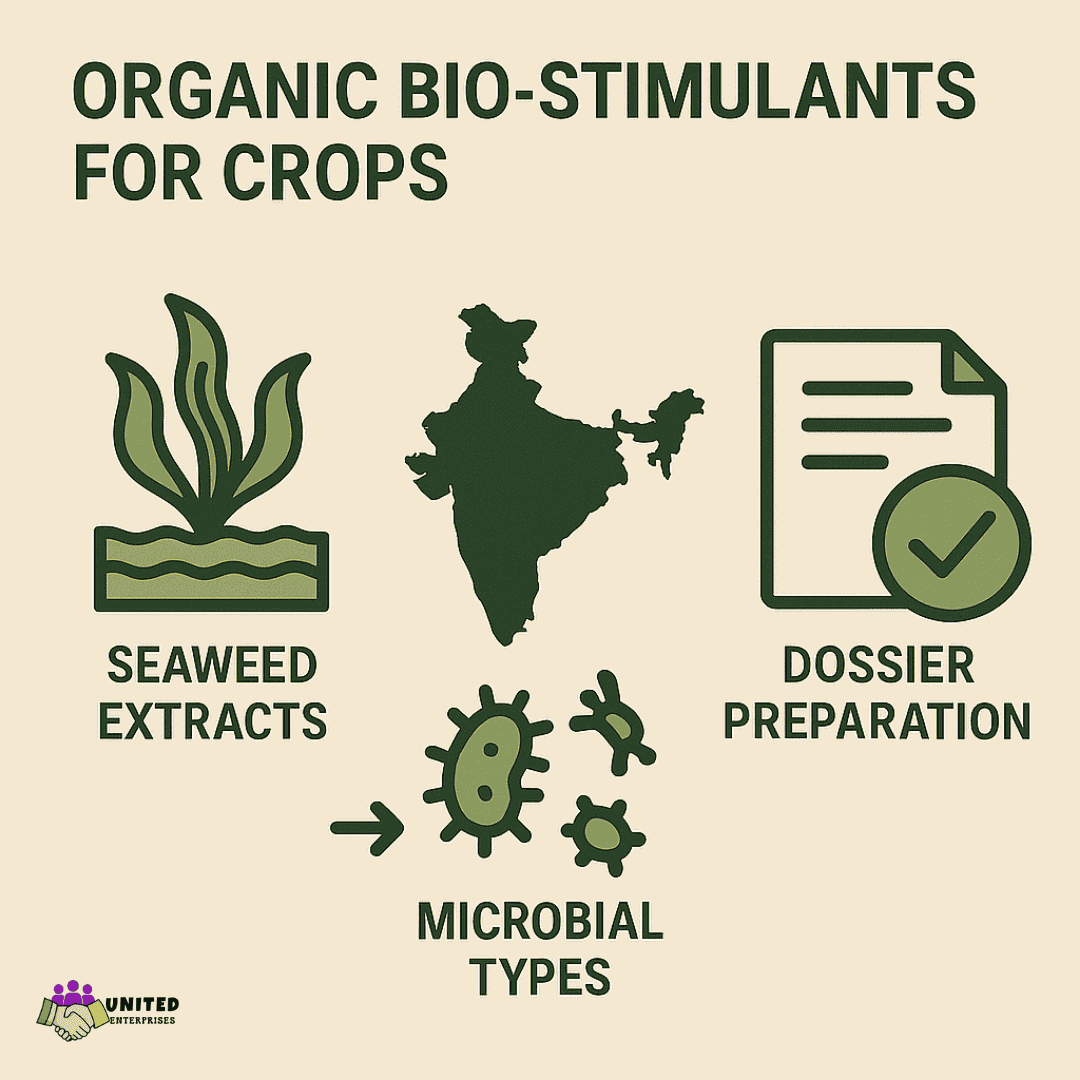BIO STIMULANT
BIO STIMULANT
Bio-stimulants are proven to be a very important element in modern farming, as they can provide sustainable methods to increase crop yields, improve the nutrition of crops and minimize the use of chemical fertilizers. Knowing that they are produced by utilizing natural products like seaweed extracts, microbial inoculants and organic compounds.
These substances activate plant growth, enhance the well-being of soil, and are not regarded as either fertilizers or pesticides. Due to the increased popularity of environmentally friendly agricultural inputs, bio-stimulants are becoming very popular among Indian farmers and other agri-businesses.
The Government of India has ensured that the products and fertilizers are of good quality, safe and effective by making it mandatory that its regulations are adhered to under the Fertilizer Control Order (FCO) 1985.
It is mandatory according to the new requirements to submit detailed product information, scientific research trial data, toxicity evaluation and references to the FCO bio-stimulant requirements in the process of granting the bio-stimulant registration in India. This will be a step to control the market and prohibit selling either faulty or untested goods.
Bio-stimulants cannot sell without registration and this is one of the legal requirements. Registration of a bio-stimulant helps to make its credibility and market accessibility and in increasing its acceptance to farmers. With the sector expanding, it has been essential that manufacturers, importers and agri-entrepreneurs who are looking forward to facilitating sustainable agriculture by involving plant growth enhancers understand the process of bio-stimulant certification in India, its advantages and requirements.
Bio-stimulant shall be classified under any of the following categories, namely:
- Vitamins
- Antioxidants
- Biochemicals
- Antiperspirants
- Cell-free microbial products
- Protein and amino acid hydrolysates
- Humic and fulvic acid and its derivatives
- Botanical extracts, including seaweed extracts
- Live micro-organisms excluding biofertilizers and biopesticides.

Benefits of Using Our Bio Stimulant Products
-
Enhanced Root Development
Stronger root systems lead to better water and nutrient uptake, helping plants establish more quickly and withstand drought or heat stress.
-
Increased Stress Tolerance
Our bio stimulants help crops tolerate abiotic stresses like heat, drought, cold, and salinity, reducing crop loss and improving consistency.
-
Healthier Soil Microbiology
Our microbial-based bio stimulants promote beneficial soil organisms, improving overall soil fertility and structure.
-
Higher Crop Yields
By stimulating key growth processes, bio stimulants contribute to improved fruit size, better flowering, and higher yield per acre.

Key Services
Comprehensive BIO-STIMULANT Regulatory Support
Expert assistance in navigating local and international regulations for bio-stimulant registration, including dossier preparation and submission as per latest government guidelines.BIO-STIMULANT Product Registration Services
End-to-end support for national and global registration of bio-stimulant products, ensuring compliance with Fertilizer Control Orders (FCO), CIBRC, and other regulatory frameworks.Dossier Preparation for BIO-STIMULANTS
Preparation of high-quality technical dossiers as per regulatory requirements, including safety data, composition details, mode of action, and efficacy trials for bio-stimulant approval.Regulatory Compliance Audits for BIO-STIMULANTS
Detailed audits and gap analysis to ensure your bio-stimulant products meet all regulatory standards for successful registration and market authorization.
Certification of Bio-Stimaulants in India: G Form, G3 Final, and Regulatory Steps
To maintain quality, safety and transparency in agricultural inputs market, bio-stimulants certification in India has been made a formalised exercise under Fertilizer Control Order (FCO) 1985. The process of certification starts with the filing of G1 Form, which introduces a provisional registration of the bio-stimulant product.
This enables the manufacturers or importers to initiate the registration process by giving basic information regarding the composition of the product, material source, and purpose of use.
When the proof of concept license is provided, the applicants are required to meet other conditions where they should meet the bio-efficacy tests, reports on toxicity, chemical analysis, and bio-stimulant testing on the sample using the laboratories certified by the FCO.
Once these steps are successfully accomplished, the applicant then goes on to file the G3 Final Form since it is a necessary step to ensure that he/she gets registered permanently and obtains the official bio-stimulant certificate in India.
These control measures indicate that any plant growth enhancers in India must undergo scientifically corroborated standards to go to the farmers. The procedure also checks the compliance with restrictions on heavy metals and microbial pollution, in particular, of organic crop bio-stimulants.
Following these guidelines not only make them legal but also creates credibility of the products in a fast growing sustainable agriculture bio-input market.
With the G Form and G3 Final procedure, there is no doubt that manufacturers may take their bio-stimulant products to the Indian market without any reservations because it has the full support of the law.

Bio-Stimulant Application Process and Licensing Authority

- The process of bio-stimulants application in India is a regulatory mechanism that is required by the Fertilizer Control Order (FCO) 1985 acts under the Ministry of Agriculture and Farmers Welfare. Through this organized procedure, all plant growth enhancers being produced in India, including those by organic and microbial means are safe, effective and have the ability to meet the national standards set in agriculture.
- The process is started whereby the G1 Form is to be submitted to the relevant State Agriculture Department accompanied by a comprehensive product dossier. This comprises the composition of the product, the manufacturing technique, scientific information, evidence of safety and the touted benefits.
- The manufacturers also need to submit the samples to bio-stimulant laboratory analysis in India, which includes the following parameters: heavy metal contamination, microbial contamination levels, and physical-chemical properties.
- After some readiness analysis has been completed and lab tests passed, the product has temporary approval and additional field testing and data gathering can begin. The applicant will then file the G3 Final Form together with complete documentation to obtain the final product approval. The whole procedure can be spatially brief (6-12 months) depending on how prepared and well-submitted responses are.
- Each state has the bio-stimulant licensing authority which liaises with the central nodal body to provide certifications. The last certificate in India on the bio-stimulant product brand certifies that it meets all the guidelines of the FCO 1985 bio-stimulant guidelines and is allowed to be manufactured, imported, and sold in India.
- Adherence to this licensing procedure does not only assure legal functioning, but it fosters confidence between the farmers and the agri-retailers. It plays a major role in achieving success in the introduction of certified organic bio-stimulants for crops in the Indian agricultural market.
Lab Testing and Dossier Preparation for Bio-Stimulant Compliance
Laboratory tests and compilation of dossiers play a very crucial role in being bio-stimulant compliant according to FCO 1985 in India. A product does not only need to be certified, but it is analyzed thoroughly to make sure it is not a violator of the specifications that are described in the bio-stimulant norms that were presented by the Ministry of Agriculture.
The testing of the bio-stimulants in India is performed in the government approved labs and includes a wide variety of parameters. These are physical and chemical parameters, pH, solubility, heavy metal concentration (such as lead, arsenic and cadmium) and micro-biotic pollution. Testing involves the implementation of measures to make sure that the bio-stimulant is secure to crops, soil, human beings and the natural habitat.
In parallel with the testing, the applicants are supposed to provide a comprehensive technical dossier during the approval process. The dossier must contain product formulation, method of manufacture, mode of action, stated agronomic advantage, outcomes of bio-efficacy tests, toxicity tests and quality assurance procedures. This paper will aid the product in terms of its functional role as a plant growth booster and confirm its adherence to the FCO bio stimulant requirements.
Successful approval of bio-stimulant products and getting hold of the official bio-stimulant certificate in India requires proper preparation of the dossier and passing through laboratory testing. Correct and thorough information in the report of the laboratory and dossier pieces gives better chances in easy registration and approval.


Benefits of Bio-Stimulants in Agriculture and Plant Growth in India
There is extensive multiplicity of agronomic benefits of bio-stimulants which is making them such a vital input to modern and sustainable farming in India. Bio-stimulants, unlike traditional fertilizers which provide nutrients, stimulate the physiological activities of the plant and consequently, cause the plant to grow, stress and produce productive effects.
With Indian agriculture being limited by climatic inconsistency and soil erosion, bio-stimulants are coming in handy to provide healthier crops and yields.
Such products in India contain root stimulators and nutrient uptake enhancers (plant growth boosters such as seaweed extract, and amino acids, humic materials and beneficial microorganisms), which aid root proliferation and nutrient absorption, and result in improved flowering and fruit production.
They also enhance resistance of abiotic stress on the plants like those provided by drought, saltiness and extreme temperatures, which is most often experienced in India by farmers.
The role of bio-stimulants is also significant in enhancing soil health by stimulating the microbial health of soil, decreasing the overuse of chemically manufactured fertilizers and increasing sustainability of the soil. They are particularly relevant during organic-farming when natural inputs are prime.
The use of these inputs is also increasing at a high rate under the guidance of FCO 1985 bio-stimulants and the support of the government. Consequently, it is making bio-stimulants in plant growth to be a favorite among farmers considering an increase in crop quality and production with no negative impact on environmental security or soil health.
Organic Bio-Stimulants for Crops: Seaweed Extracts, Microbial Types, and Soil Health
Organic bio-stimulants are natural plant growth promoters, which improve nutrient uptake and stimulate stress resistance and are not based on synthetic chemistry. Through Indian agriculture, these products have become a significant way of increasing the crop output as they sustain the soil.
The most attractive include seaweed extract bio-stimulants and bio-stimulants that depend on microbes, which are in tandem with sustainable farming. Not only are they useful in enhancing the performance of crops but they also facilitate the organic certification standards thus making them suitable in sustainable farming.
Important advantages and kinds of biological bio-stimulants:
Seaweed Extract Bio-Stimulants
Natural Plant hormones such as cytokinins and auxins.
Enhance root development and absorption of nutrients.
Make crops resistant to drought, salinity, and temperature extremity.
Microbial-Based Bio-Stimulants
Add some good microbial species such as Rhizobium, Azospirillum and Trichoderma.
Assist in the capture of atmospheric nitrogen and nutrients solubilization.
Hold off virulent pathogens and boost the boundaries of the plants.
Meaning of Healthy Soil
Increases the levels of microbial biodiversity and organic matter.
Improves the soil quality, looser and water retention.
Lowers the long term reliance on chemical input.
Organic bio-stimulants lead in the field of sustainable agriculture bio-inputs and gain more and more popularity among Indian farmers who supposedly want to produce much more and have a longer life expectancy of the soil.

Benefits of Bio-Stimulants in Agriculture and Plant Growth in India
There is extensive multiplicity of agronomic benefits of bio-stimulants which is making them such a vital input to modern and sustainable farming in India. Bio-stimulants, unlike traditional fertilizers which provide nutrients, stimulate the physiological activities of the plant and consequently cause the plant to grow, stress and produce productive effects.
With Indian agriculture being limited by climatic inconsistency and soil erosion, biostimulants are coming in handy to provide healthier crops and yields.
Such products in India contain root stimulators and nutrient uptake enhancers (plant growth boosters such as seaweed extract, amino acids, humic materials and beneficial microorganisms), which aid root proliferation and nutrient absorption and result in improved flowering and fruit production.
They also enhance resistance to abiotic stress on the plants like those provided by drought, saltiness and extreme temperatures, which is most often experienced in India by farmers.
The role of bio-stimulants is also significant in enhancing soil health by stimulating the microbial health of soil, decreasing the overuse of chemically manufactured fertilizers and increasing the sustainability of the soil. They are particularly relevant during organic farming when natural inputs are prime.
The use of these inputs is also increasing at a high rate under the guidance of FCO 1985 bio-stimulants and the support of the government. Consequently, it is making bio-stimulants in plant growth to be a favorite among farmers considering an increase in crop quality and production with no negative impact on environmental security or soil health.
Frequently Asked Questions
A bio-stimulant enhances plant growth and resilience naturally, while fertilizers supply essential nutrients directly.
Submit G1 and G3 forms along with required documents and samples to the State Agriculture Department as per FCO 1985 guidelines.
G1 is for provisional registration, while G3 is for final approval after successful testing and document verification.
Product composition, label claims, safety data, trial reports, CoA, and manufacturing details are required.
Bio-stimulants must pass efficacy, toxicity, heavy metal, and microbial contamination tests in approved labs.
Yes, imported bio-stimulants must be registered under FCO 1985 before sale or distribution in India.
The registration and approval process typically takes 6–12 months depending on compliance and testing outcomes.
Yes, if it meets organic certification standards and contains only approved natural ingredients.
They are regulated under Clause 20C of FCO 1985, requiring registration, labeling, and quality testing.
Selling unregistered bio-stimulants can lead to fines, product seizure, and cancellation of manufacturing licenses.


